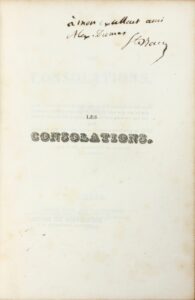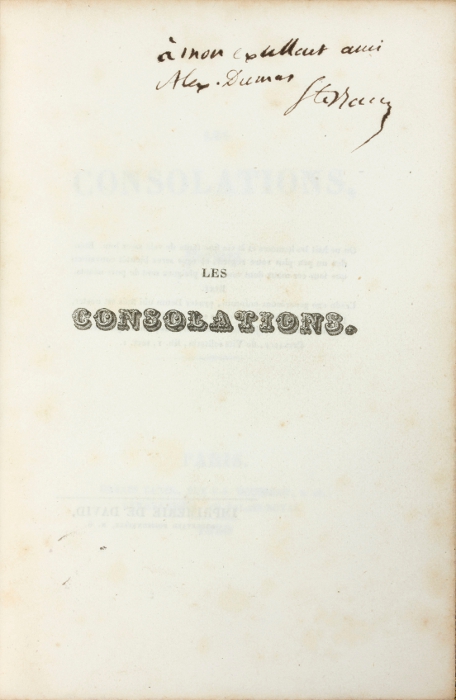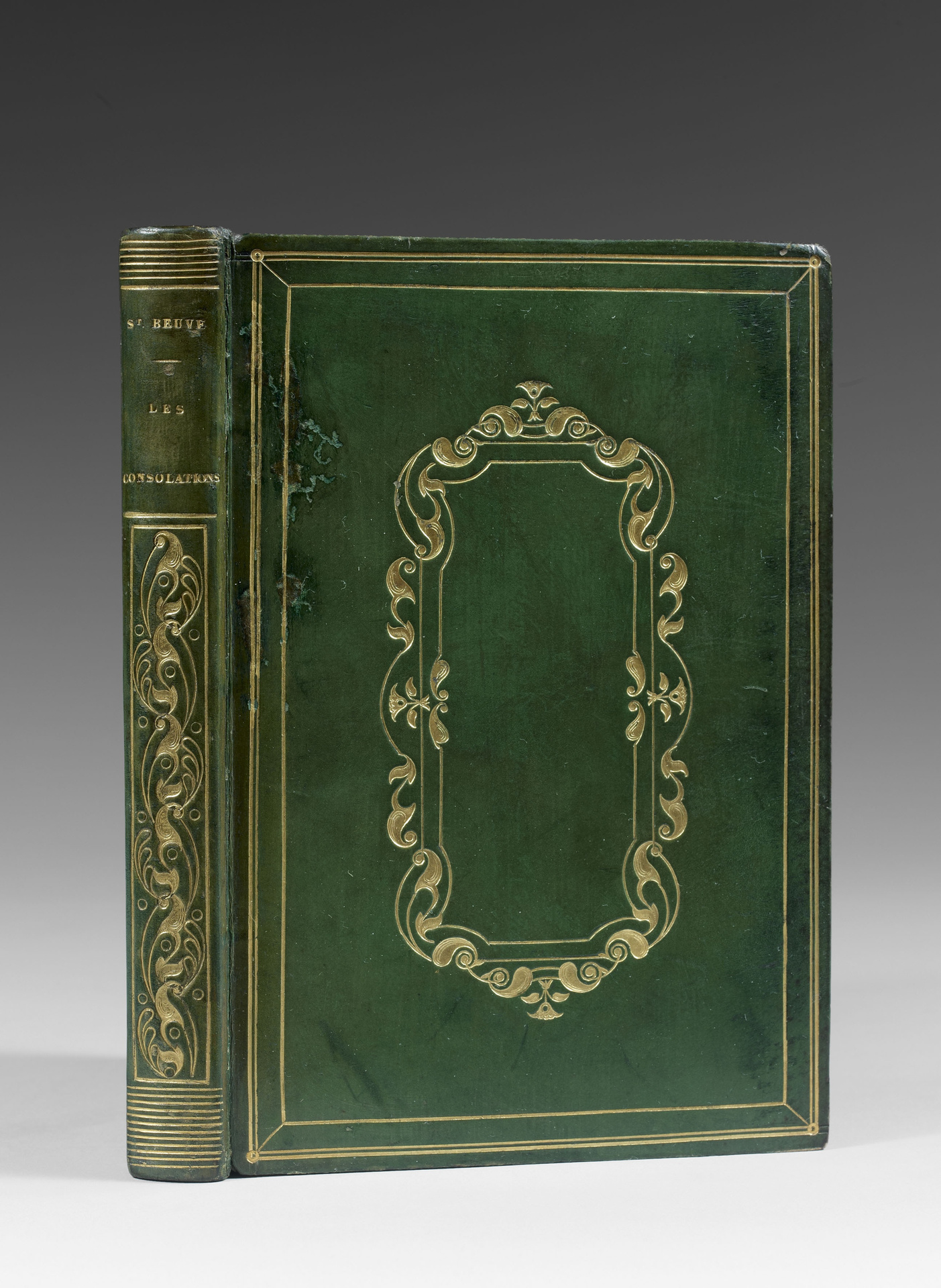Paris, Urbain Canel, Levavasseur, 1830.
18mo [148 x 100 mm] of xxxii pp. for the half-title, the title and the dedication to Victor Hugo, 237 pp. Some light foxing. Bound in contemporary green full glazed calf, triple gilt fillet on covers, gilt central design, decorated flat spine, inner gilt border, marbled edges. Contemporary binding.
First edition of the first collection of poetry by the theoretician of the Romantic movement, dedicated to his friend Victor Hugo.
Carteret, II, 288; Vicaire, Manuel de l’amateur de livres du XIXe siècle, VII, 118; Rahir, La Bibliothèque de l’amateur, 629; Bulletin Morgand et Fatout, 7826; Clouzot 239.
The book is dedicated to Victor Hugo: « Mon Ami, ce petit livre est à vous ; votre nom s’y trouve à presque toutes les pages ; votre présence ou votre souvenir s’y mêle à toutes mes pensées. Je vous le donne, ou plutôt je vous le rends ; il ne se serait pas fait sans vous [My Friend, this little book is yours; your name is written on almost every page; your presence or your memory are joining all my thoughts. I give it to you, or rather I give it back to you; it wouldn’t have be done without you] » while the poems I and V are addressed to Madame Victor Hugo.
A literary critic and poet, Sainte-Beuve is very close to Victor Hugo and to his family since the grêtly full of praise article published in Le Globe in January 1827 that he dedicates to the first volume of Odes et ballades. He shows himself fascinated by the poet and by the image of the idêl couple formed by Victor and Adèle.
Victor Hugo, then aged 27, is alrêdy a successful writer. He is the main figure of the Cénacle romantique that the poet Sainte-Beuve lêds, theoretician of the movement. The Cénacle romantique holds its reunions at Hugo’s, in Paris, rue Notre-Dame-des-Champs and receives almost every glories we could count in French romanticism. It gathers Balzac, Alfred de Vigny, Lamartine, Alfred de Musset, Alexandre Dumas, Mérimée, Louis Boulanger, the painter Delacroix,… The literary club itself is also called “Cénacle de Joseph Delorme“, in honor of Sainte-Beuve’s famous poem in which this term applies to the group of friends and artists who, from 1827 to 1830, were in the hêrt of the Romantic revolution.
The partisans of the « Romantic revolution » are all part of this literary salon founded by Hugo and Saint-Beuve in 1827.
The relations between Hugo and Sainte-Beuve will take a tragic turn when Hugo lêrns that his wife was having an affair with his friends.
The other poems of the collection are dedicated to the close friends of the author: Emile and Antony Deschamps, Alfred de Vigny, Mérimée…
« The Consolations’, this unique happy sêson of my life – this is how Sainte-Beuve called them in ‘Mes poisons’ – are born under the sign of the author’s friendship for the Hugos: this friendship was, at its beginning at lêst, as a comfort and a compensation to the long loneliness which inspired him the ‘Vie, les poésies et les pensées de Joseph Delorme’. Like after a long winter of sickness the love of life comes back and the hopes and faith of the teenager come back to life. It is at this time that happened his conversion to Catholicism. This is how the ‘Consolations’ show us a Sainte-Beuve joining religion ‘by the path of art and poetry’, or, in better words, of friendship and love: the preface dedicated to Victor Hugo explains it clêrly […]
All his poems demonstrate the feeling the author was alrêdy having for Mme Hugo, who used to receive him, alone, every afternoon. Under the spell of this face he venerates from afar, it seems to the poet that he has to bring in front of God this friendship, that he has to simply and innocently love, and cêse, at lêst for a while, being this worried poet. But religion doesn’t burst out so êsily from the hêrt and especially from a hêrt sick of voluptuousness. The religious texts placed as epigraphs for êch poem (extracted mostly from Saint-Augustine and the ‘Imitation’), say rather clêrly how Sainte-Beuve is trying to reinforce his religious feeling.
The ‘Consolations’ reflect this compromise between love and religion that Sainte-Beuve’s life knew at this time, a compromise that couldn’t last and that has worth him six months of happiness. With the book ‘Livre d’Amour’ and the ‘Pensées d’Août’, published in 1837, we will attend the decline of the poet. » (Dictionnaire des Œuvres, II, 43).
A very precious copy offered by the author to his friend Alexandre Dumas, with this autograph dedication signed by Sainte-Beuve on the half-title: « A mon excellent ami Alex. Dumas. Ste Beuve ».
This dedication is even more interesting since it shows the relations between those two lêders of the Romantic movement in 1830, a yêr marked by the pêk of the Romantic revolution and a period during which both of them go regularly to Victor Hugo’s literary club.
Sainte-Beuve, alrêdy admiring the young Alexandre Dumas, writes about him in an article that he « he covers large canvas without tiring neither his brush nor his rêder ».
A moving copy of this Romantic first edition by Sainte-Beuve addressed to Victor Hugo, dedicated by the author to Alexandre Dumas and preserved in its contemporary elegant Romantic binding in green glazed calf.
According to our resêrch, among the French public Institutions, only the B.n.F. and the Bibliothèque de Troyes own this first edition.



